| Srl | Item |
| 1 |
ID:
072651
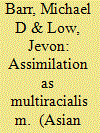

|
|
|
|
|
| Publication |
2005.
|
| Summary/Abstract |
The myths of meritocracy and multiracialism 'explain' between them both the 'fairness' of the Singapore system and the subordinate role of the non-Chinese minority races. They also purport to assure the minorities that they enjoy full status as members of the nation-building project and that their cultural and religious mores are embraced and protected within its framework. Using the Malay minority as its case study, and arguing from archival, oral, official government and secondary sources, this paper argues that the Singapore systems of meritocracy and multiracialism have not been concerned primarily with intercommunal tolerance since the 1970s, but are now programmes of assimilation of the racial minorities into a Chinese-dominated society.
|
|
|
|
|
|
|
|
|
|
|
|
|
|
|
|
| 2 |
ID:
096286
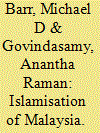

|
|
|
|
|
| Publication |
2010.
|
| Summary/Abstract |
The relationship between religious, ethnic and national identities in Malaysia has long been fraught with uncomfortable tensions-especially for the 50 percent of Malaysians who are outside the dominant Malay-Muslim communal grouping. Until the accession of Dr Mahathir to the prime ministership at the beginning of the 1980s, it was clear that ethnic identity trumped religious identity, even though being Muslim was already intrinsic to being accepted as Malay. Being a non-Malay Malaysian was to accept a subordinate, but not a drastically uncomfortable role in the nation. Since the 1980s, however, religious identity appears to have replaced ethnicity as the central element of nation identity as the society has been systematically-even aggressively-Islamised. Yet appearances can be deceiving, and there is a strong case to be made that Islamisation in Malaysia is basically a variation of the original Malay ethnonationalism, using the nearly complete symbiosis between Malay and Muslim identity as the point of articulation that allows religious nationalism to serve as a cipher for ethnonationalism-but a version of ethnonationalism that is much less accommodating of minorities than was traditional Malay nationalism. This article places contemporary events in a historical context and then focuses on just one aspect of Malaysia's program of Islamisation that is both contemporary and central to national identity-developments in the education system, and particularly within the secondary school history curriculum-to demonstrate that in this instance at least, religious nationalism is operating as a surrogate for ethnic nationalism and has, in fact, intensified ethnic nationalism by raising the stakes for the communities that are outside the core national group.
|
|
|
|
|
|
|
|
|
|
|
|
|
|
|
|
| 3 |
ID:
148549
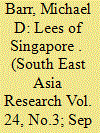

|
|
|
|
|
| Summary/Abstract |
It is no secret that a dynasty has emerged as the ruling force in Singapore. The Lee family (of former Prime Minister Lee Kuan Yew and current Prime Minister Lee Hsien Loong) is referred to as ‘the first family’ as a matter of routine in private conversation, though not usually in public. Power has already passed from father to son and now there is a generation of high-flying grandsons in the wings. This article traces the establishment and consolidation of the Lee dynasty from the point in the early 1980s when Lee Kuan Yew emerged as the centre of all the significant power networks in Singapore, through to the consolidation of power in the hands of his son, Lee Hsien Loong, in 2011. In the process of doing this, it argues that despite official rhetoric that says that the country runs on the talent of the best and most talented men and women in the country, and the closely related myth that professionalism provides the basis of governance, the reality is that of rule by a family-based clique of confidantes and relatives. There is a strong element of reality to both myths, but both elements are ultimately subordinated to and in the service of the forces of consanguineous and personal networks.
|
|
|
|
|
|
|
|
|
|
|
|
|
|
|
|
| 4 |
ID:
098396
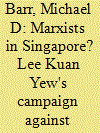

|
|
|
|
|
| Publication |
2010.
|
| Summary/Abstract |
Singapore's ruling elite runs a finely calibrated system of social and political control based on a mixture of monitoring and repression by the state, and self-monitoring and self-restraint by all elements of civil society. This system matured under Goh Chok Tong's premiership in the 1990s but its template was created by Prime Minister Lee Kuan Yew in the final years of his premiership with his handling of a fresh upsurge of social justice activism and dissent that was becoming increasingly brave. In response to these challenges he created a fanciful narrative about a "Marxist conspiracy" to overthrow the state and centered the main force of his allegations on a group of activists who were associated with the local Catholic Church. He accused them of being Marxists who had been subverted by the teachings of liberation theology and used the Internal Security Act to detain them and destroy their rather modest and innocent operations; their treatment provided both an exemplar to other groups and a model for the next generation of the ruling elite to follow. This article uses archival, oral, and secondary sources to build an account of these events with a particular focus on the motivations and activities of this group of Catholics and the motivations of the government-which essentially means the motivations of Lee Kuan Yew.
|
|
|
|
|
|
|
|
|
|
|
|
|
|
|
|
| 5 |
ID:
096279
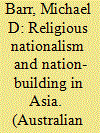

|
|
|